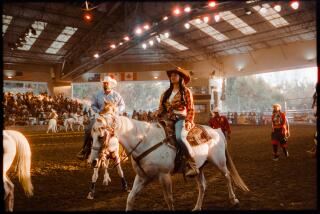Day Honors Blacks’ Experiences in U.S.
- Share via
Keith Anderson chose to celebrate Juneteenth at the Autry Museum of Western Heritage in Griffith Park.
Sometimes called the African American Fourth of July, Juneteenth commemorates June 19, 1865, the day an American general rode into Galveston, Texas, and announced the end of slavery.
In fact, the Emancipation Proclamation freeing the slaves in the Confederate states had been issued by President Abraham Lincoln 2 1/2 years earlier. But the news had been slow to reach Texas, whether by accident or design on the part of the Texas farmers who wanted unpaid black workers to bring in one more cotton crop.
Anderson, a 38-year-old Pasadena resident, has marked the holiday since he was a child. He remembered the holiday as a time to visit family in Texas and Arkansas..
On Saturday, Anderson introduced the holiday to a new generation, four young men who were enthralled by half a dozen members of the New Buffalo Soldiers.
Admiring the 19th century rifles, sabers and other equipment of the New Buffalo Soldiers, modern-day African Americans who portray the U.S. Army’s first black cavalry regiments, were Anderson’s charges--Angel, Nathan, Darrell and Mark.
Anderson, who describes himself as their mentor, said he could not reveal their last names because they are with Five Acres, a nonprofit organization in Altadena that provides services to minors who are wards of the court.
Later, the boys, who range in age from 11 to 14, heard actor Tim Russ read the Emancipation Proclamation to a hundred people of many races and ethnicities.
Russ is probably best known for his role as the Vulcan Tuvok on the TV show “Star Trek: Voyager.” “We’ve come a long way--from emancipated slaves to Vulcans in space,” he said.
As founder John Mapp of Glendale explained, the New Buffalo Soldiers was formed in 1992, inspired in part by the film, “Glory,” which portrays the heroism of black Union soldiers despite the discrimination they experienced.
According to Mapp, who is a neonatologist by profession, 180,000 African Americans fought during the Civil War, but none were members of the regular Army.
“The group we portray is the 10th Cavalry,” he said. “They were formed after the end of the Civil War, in 1866, by an act of Congress that created two regiments of black cavalry, with white officers.” Like the 9th Cavalry, the 10th regiment was part of the regular U.S. Army.
“This was such a landmark,” Mapp said.
Clyde Phillips, a counselor at Orange Coast College in Costa Mesa, said one of the reasons he became a New Buffalo Soldier is that it allows him to broaden the average student’s understanding of both black and American history.
“Most of the students can tell you that blacks were slaves and that’s about it.”
More to Read
Sign up for The Wild
We’ll help you find the best places to hike, bike and run, as well as the perfect silent spots for meditation and yoga.
You may occasionally receive promotional content from the Los Angeles Times.






